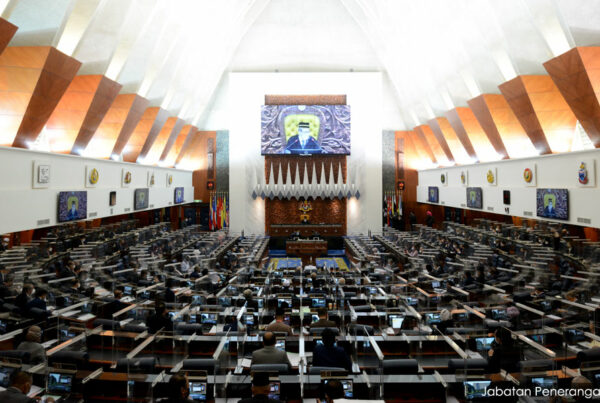18 November 2024
Project Stability and Accountability for Malaysia (Projek SAMA), The Coalition for Clean and Fair Election (Bersih), ROSE Sarawak and ENGAGE repeat the call for amendments to Article 45 of the Federal Constitution to increase 15 seats each for Sabah and Sarawak in Dewan Negara, so that East Malaysia can constitute a 35% veto bloc on constitutional amendments before the 16th General Election (GE16).
Deputy Prime Minister Datuk Seri Fadillah Yusof announced that 10 November that “the implementation of additional parliamentary seats in Sabah and Sarawak will only be finalised after GE16”. https://bernama.com/en/general/news.php?id=2361592
We welcome that this is a frank admission that the demand for 35% parliamentary seats will definitely not happen before GE16.
Is there any guarantee that East Malaysia will get the constitutional veto power after GE16? If a single coalition wins a simple majority of 112 seats in the Peninsula alone, what is the likelihood of this new government agreeing to a constitutional veto power for East Malaysians?
We therefore urge the Madani Government to enhance Malaysia’s federalism by transforming the Dewan Negara into the guardian of states interests, with 35% of seats controlled by Sarawak, Sabah and Labuan before GE16.
In most federations, the upper house of parliament functions like the brake in a vehicle to force more deliberation, over-representation of less populous states and even veto power held by special states are democratically justified. The principle of ‘one person, one vote, one value’ can be applied to only the lower house, which decides on government formation in a parliamentary democracy.
It is most regrettable that the Malaysia Agreement 1963 (MA63) did not make the Dewan Negara an elected and empowered House where Sabah, Sarawak and Singapore were given permanent constitutional veto power.
After suffering from over-concentration of power in the Federal Government, Malaysians today must be bold to demand decentralisation, both in legislative, administrative and fiscal decentralisation and in safeguards for state rights.
Since Article 159(3) of the Federal Constitution categorically provides that ordinary constitutional amendments “shall not be passed in either House of Parliament unless it has been supported on Second and Third Readings by the votes of not less than two-thirds of the total members of that House”, if Sabah and Sarawak combined have more than one-thirds of the seats in Dewan Negara, then no constitutional amendments that affect Sabah and Sarawak’s state interests can be passed without the support of Senators from Sabah and Sarawak.
Hence, if the Dewan Negara can be expanded from 70 seats to 100 seats, with 15 seats each for Sabah and Sarawak, such that Sabah, Sarawak (each with two existing seats + 15 new seats) and Labuan (one seat) constitutes a 35% bloc, then the fear espoused by Sarawak Premier Tan Sri Abang Zohari Abang Openg, that constitutional amendments made in 1963 in accordance with MA63 may be annulled, can be permanently put to rest even before GE16.
Critiques often allude that the Dewan Negara is a toothless paper tiger therefore they reject the notion that states can exercise veto in the Dewan Negara. The answer is not to eliminate it from the picture altogether but to transform the Dewan Negara into an elected entity with a democratic mandate and more powers to check and balance the Dewan Rakyat. As a start, to give the 34 Senators from Sabah and Sarawak independence and greater political legitimacy, they can be elected directly by a parliamentary act, as provided by Article 45(4)(b) of the Federal Constitution. This would ensure that Sabahans and Sarawakians have as much control of their senators as they do of their MPs.
Eventually, Article 68 of the Federal Constitution can be changed so that a fully elected Dewan Negara can have veto power on ordinary non-monetary bills. While such an extensive reform may happen only after GE16, constitutional veto power by 34 Senators from Sabah and Sarawak can happen in 2025. Unlike the case with Dewan Rakyat, no negotiation of seat allocation between the Peninsular states and no constituency delimitation – which can take up to two years as per the constitutional provision – are needed for Dewan Negara.
We urge the Sarawak and Sabah governments to lead the 11 Peninsular state governments in pushing for a national and nationwide decentralisation agenda and has confidence that Sarawak’s and Sabah’s leadership would be welcomed.
Any national agenda of decentralisation must always give Sabah and Sarawak more powers and rights than the Peninsular states, as MA63 intended such an asymmetric federation in the spirit of equal partnership between the then four regions.
We wish to remind all quarters that in all federal-state negotiations, parliamentary representation included, the Federal Government has neither constitutional power nor political legitimacy to unilaterally represent the 11 Peninsular states.
We warn that any unilateral decision by the Federal Government on behalf of the 11 Peninsular states may invoke the wrath of the majority voters and land the Federal Government in an unprecedented political catastrophe.
Just like any decisions affecting the interests of the 17% of Malaysian voters in East Malaysia cannot be made without the concurrence of Sabah and Sarawak, any decisions affecting the interests of the remaining 83% of Malaysian voters in the Peninsula cannot be made without consulting the 11 state governments.
For matters affecting all, all must take part in negotiations.
When Malaysia was formed, the 11 Peninsular states did not dissolve themselves to form a new region of Malaya to federate with Sabah, Sarawak and Singapore. Instead, the Federation of Malaya was dissolved to free the 11 Peninsular states to federate with the three other states. This historical fact must not be denied or distorted for political convenience or expediency in the name of equal partnership.


